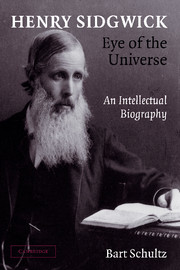8 - Last Words?
Published online by Cambridge University Press: 09 July 2009
Summary
Never, surely, was the English mind so confused, so wanting in fixed moral principles, as at present.
Sir John Seeley, “Ethics and Religion,” paper delivered to the Cambridge Ethical Society in 1888I share to the full the general disillusionment of political idealists, perhaps all the more fully that I am spending my time in trying to finish a book on the Theory of Politics, with a growing conviction that the political results of the coming generation will be determined by considerations very unlike those that come to the pen of a theoretical person writing in his study.
Sidgwick to A. J. Patterson, December 27, 1889 (M 504)The brutalism that was reviving in Europe was displayed most grimly in the ‘Congo Free State’ sanctioned by the Berlin Conference on Africa in 1885, and from then until 1908 a private empire of King Leopold of the Belgians. Here could be seen private enterprise at its worst, free from all public inquiry or check, and the new plutocracy at its glossiest, with a royal manager. Its devious origins show how missionary zeal, like all Europe's better impulses, could be exploited by money-grubbers. A titular Archbishop of Carthage launched with papal approval a campaign for stronger action against slave-trading; he invited Christian soldiers to volunteer, and dreamed of a new order of knights-errant. Leopold encouraged the idea, and when his ‘Free State’ was set up humanitarians rejoiced.
His agent for the preliminary spadework or collection of ‘treaties’ was H. M. Stanley, the Anglo-American explorer whose chief performance in Africa was his expedition to find Livingstone in 1871–2…. In the Congo it was as easy as elsewhere to employ Africans of one tribe against another. Leopold assembled a mercenary army with, by 1905, 360 officers from up and down Europe, and 16,000 natives. Its business was to ensure quick profits in rubber, ivory, or palm-oil collected as tribute or by forced labour. The consequences were of a sort and on a scale not seen again in the world until the Nazi epoch, when they were seen in Europe itself.
V. Kiernan, The Lords of Human Kind- Type
- Chapter
- Information
- Henry Sidgwick - Eye of the UniverseAn Intellectual Biography, pp. 669 - 726Publisher: Cambridge University PressPrint publication year: 2004



